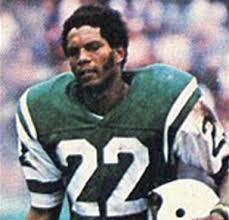Ask any Jets fan who the greatest players are in franchise history, and you'll get a lot of similar answers: Joe Namath, Don Maynard, Mark Gastineau, Joe Klecko, Curtis Martin, Wayne Chrebet, Darrelle Revis. There might even be a little love for the likes of Matt Snell, Marty Lyons, and Mo Lewis. Well that got me to thinking, is that all there is to our history? Do we only have about a dozen players who are worthy of celebrating? Conversely, are there Jets who played well for the team for a long period of time through the leaner years, but don't get the recognition they deserve, likely because they played on a lot of lousy teams?
Owens played college football at the University of Miami in the early 1970's, where he majored in Biology and Chemistry. He was the third of four black athletes recruited to play at the U and the third black student to earn a scholarship. He was named a First-Team All-American defensive back, Most Valuable Defensive Player of the North–South All Star Game, and MVP of the Coaches All-American Game.
The Jets selected Owens with the 13th pick in the first round of the 1973 draft. He wasted no time in making impact plays. During his rookie season, he recorded his first career interception against Terry Bradshaw and the Steelers. In his next game in Denver, he returned a kickoff 82 yards for a touchdown. This turned out to be the Jets' only touchdown scored on a kickoff return during the 1970s. He earned the respect of his teammates to where he was named defensive team captain for three straight years. He led the Jets in interceptions five of his seven 7 years, amassing 21 total, and returning two for touchdowns. Only eight Jets have recorded more interceptions than Owens. We don't know his tackle stats as tackles did not become an official NFL stat until 2001.
That 13th season was his first with the Raiders and he played a big role in helping them win the 1980 Super Bowl, recording a game-high seven tackles. But even before the big game, he picked off Dan Fouts in the AFC Championship game in San Diego.
Owens ended his 10 year NFL career having played 137 games, recording 30 interceptions, 13 fumble recoveries, and four pick-6 touchdowns. He missed only 3 games due to injury.
Today Owens is a Congressional representative in Utah, having won his election in November 2020.


No comments:
Post a Comment